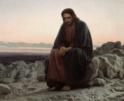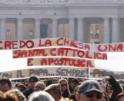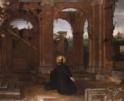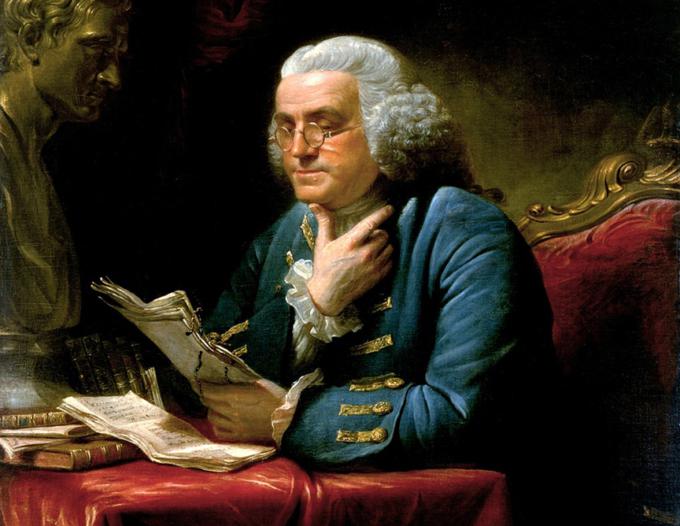
Spirituality
About 15 years after Franklin wrote his New Version, he stood up at the Constitutional Convention and rebuked his fellow patriots for having neglected prayer . . .
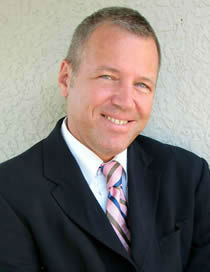
Pakaluk
Samuel Johnson once said that any book that we have not read is for us as if it were published yesterday -- The Odyssey, Plato's "Phaedo," More's "Utopia" -- they are all, for a novice, equally fresh and new.
I thought of Johnson's remark when recently I encountered Benjamin Franklin's "celebrated" New Version of the Lord's Prayer, which was unknown to me. When did he write it exactly? The National Archives dates it to 1768, when Franklin was in his 60s, the work of an experienced and wise man.
Franklin's intent in his line-by-line rewriting seems to have been to make the meaning plain, so that it has immediate practical consequences for those who recited it.
For instance, instead of "Our Father which art in Heaven," he says we should begin simply with "Heavenly Father," as this "is more concise, equally expressive, and better modern English." He is right on these points, and we might allow him that "our" is implicit when the prayer is said by many in common.
As regards, "Hallowed be thy name," Franklin says, again correctly, that people have little idea what this means. The Jewish context of a holy proper name which may not even be pronounced (YHWH, "I am") has been lost. Our term "God" is a common noun. His New Version instead has: "May all revere thee."
Franklin does not like "Thy Kingdom come," because of its connection with the theocracy that the Jewish people longed after. His version is: "may all become thy dutiful Children and faithful Subjects" -- a conception which seems not far from that of the "reign of God," favored by many modern exegetes.
He thinks it correct that Luke's language, "forgive us our trespasses," has won out over Matthew's "forgive us our debts," speculating that talk of forgiving debts proved to be "an inconvenient idea in a trading nation!" And yet, he says, to ask God to forgive us our trespasses "as we forgive those who trespass against us" seems presumptuous, as we said, "we'll hope you will be at least as good as we are." On Franklin's rewriting the petition becomes: "Forgive us our trespasses, and enable us likewise to forgive those that offend us."
Franklin's New Version here is of course not a good translation of the Lord's words. Yet Franklin's underlying thought seems admirable: the New Version of the petition, he says, "instead of assuming that we have already in and of ourselves the grace of forgiveness, acknowledges our dependence on God, the fountain of mercy, for any share we may have of it, praying that he would communicate of it to us."
Jesus once posed this parable. A father told each of two sons to go out and work in his vineyard: the first said he would and did not go out; the second said he didn't want to but did go out. The second but not the first did the will of his father. In the same way, I myself would prefer to have politicians over me who, like Franklin, wrestled earnestly with the meaning of the Lord's Prayer, rather than talk a good religious talk in "Gospel" language.
About 15 years after Franklin wrote his New Version, he stood up at the Constitutional Convention and rebuked his fellow patriots for having neglected prayer:
"In this situation of this Assembly groping as it were in the dark to find political truth, and scarce able to distinguish it when presented to us, how has it happened, Sir, that we have not hitherto once thought of humbly applying to the Father of lights to illuminate our understandings? In the beginning of the contest with Great Britain, when we were sensible of danger we had daily prayer in this room for the Divine Protection. -- Our prayers, Sir, were heard, and they were graciously answered. All of us who were engaged in the struggle must have observed frequent instances of a Superintending providence in our favor. To that kind providence we owe this happy opportunity of consulting in peace on the means of establishing our future national felicity. And have we now forgotten that powerful friend? Or do we imagine that we no longer need His assistance.
"I have lived, Sir, a long time and the longer I live, the more convincing proofs I see of this truth -- that God governs in the affairs of men. And if a sparrow cannot fall to the ground without his notice, is it probable that an empire can rise without his aid?"
He goes on to quote the Psalmist, "unless the Lord builds the house, they who build it labor in vain," and he predicts disaster without prayer:
"I also believe that without his concurring aid we shall succeed in this political building no better than the Builders of Babel: We shall be divided by our little partial local interests; our projects will be confounded, and we ourselves shall be become a reproach and a bye word down to future age. And what is worse, mankind may hereafter from this unfortunate instance, despair of establishing Governments by Human Wisdom, and leave it to chance, war, and conquest."
A thought, then, as we see a Babel forming before us: before we lament that "liberalism has failed," let us remember that its wisest founder averred, and his compatriots agreed, that America could not have been built, and neither might it be preserved, without prayer.
- Michael Pakaluk, an Aristotle scholar and Ordinarius of the Pontifical Academy of St. Thomas Aquinas, is a professor in the Busch School of Business at the Catholic University of America. He lives in Hyattsville, MD, with his wife Catherine, also a professor at the Busch School, and their eight children. His latest book is "Mary's Voice in the Gospel of John" available from Amazon.
Recent articles in the Spirituality section
-
Masters week foreknowledgeMichael Pakaluk
-
Why is Lent 40 days?Michael Pakaluk
-
The eloquent ambiguity of 'I believe'Bishop Robert Barron
-
You don't get what you pay forMichael Pakaluk
-
The witness of a consecrated lifeBishop Robert Barron


